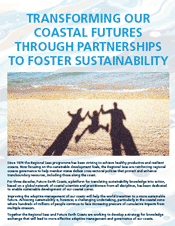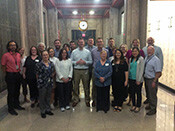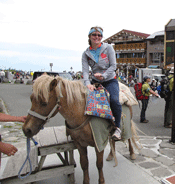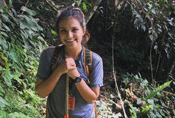Connect with IAN at the Chesapeake Film Festival
IAN will be helping to support the 2018 Chesapeake Film Festival (CFF) which runs October 11-14, 2018 at various sites on Maryland's Eastern Shore. This year's festival boasts a wide range of excellent stories. IAN will also be contributing to CFF's presence at the Waterfowl Festival (November 9-11, 2018 in Easton, Maryland) by helping to screen a series of environmental shorts.Transforming our coastal futures through partnerships to foster sustainability
 "Transforming Our Coastal Futures through Partnership to Foster Sustainability" was released earlier this month as a product of our recent workshop in Cork, Ireland with Future Earth Coasts. Our Coastal Futures is structured as a 4-step process that 1.) Brings together stakeholders, 2.) Co-designs sustainability strategies, 3.) Builds shared understanding and 4.) Co-produces interventions and enable transition pathways. This is illustrated by the experiences of the Baltic, Caribbean, Mediterranean, and Western Indian Ocean Regional Seas organizations, which have had different successes in restoration and conservation. Next steps include organizing specific projects that will demonstrate the Our Coastal Futures framework.
"Transforming Our Coastal Futures through Partnership to Foster Sustainability" was released earlier this month as a product of our recent workshop in Cork, Ireland with Future Earth Coasts. Our Coastal Futures is structured as a 4-step process that 1.) Brings together stakeholders, 2.) Co-designs sustainability strategies, 3.) Builds shared understanding and 4.) Co-produces interventions and enable transition pathways. This is illustrated by the experiences of the Baltic, Caribbean, Mediterranean, and Western Indian Ocean Regional Seas organizations, which have had different successes in restoration and conservation. Next steps include organizing specific projects that will demonstrate the Our Coastal Futures framework.
A one-day course in Communicating Science Effectively with U.S. EPA Region 1

Bill Dennison and Brianne Walsh traveled to Boston, Massachusetts on September 12-14 to teach a one-day course "Communicating Science Effectively" for U.S. EPA Region 1 staff at their office in downtown Boston. While the 25 participants had differing backgrounds and roles within the EPA, they each had one goal for the workshop: how to communicate the complex, and important data being collected into usable information for a variety of audiences. We packed a lot of material the one-day course: data visualization, conceptual diagrams, and narratives and storytelling. We look forward to following up in a few months via webinar to share how participants have been able to apply new skills in their own work!
IAN welcomes new Science Integrator, Katie May Laumann
 Katie May Laumann recently joined IAN as a Science Integrator. Katie May earned a PhD in Marine Science (Virginia Institute of Marine Science) and an MA in Conservation Biology (Columbia University). Her research experience includes sturgeon phylogenetics and seafood sustainability. Before IAN, Katie May worked as a science outreach educator in Maine. She has also worked in fisheries management, sustainability certification, and grant writing. Katie May enjoys traveling and hiking. Her favorite hiking experiences include summiting Huayna Picchu in Peru and watching the sunrise from Mount Fuji. She lives in Shady Side with her husband and Berlioz, the best cat in the world.
Katie May Laumann recently joined IAN as a Science Integrator. Katie May earned a PhD in Marine Science (Virginia Institute of Marine Science) and an MA in Conservation Biology (Columbia University). Her research experience includes sturgeon phylogenetics and seafood sustainability. Before IAN, Katie May worked as a science outreach educator in Maine. She has also worked in fisheries management, sustainability certification, and grant writing. Katie May enjoys traveling and hiking. Her favorite hiking experiences include summiting Huayna Picchu in Peru and watching the sunrise from Mount Fuji. She lives in Shady Side with her husband and Berlioz, the best cat in the world.
IAN welcomes new intern, Yesenia Valverde
 Originally from San Diego, California, Yesenia graduated last year from Brown University with an undergraduate degree in Environmental Science. Passionate about tropical ecology, her senior thesis documented climate change impacts on a bird community in a Costa Rican cloud forest. In the past, she has also studied epiphytic plant distributions in Costa Rica, bat behavior in Panama, and ant ecology in Malaysian Borneo. Yesenia plans to pursue a PhD in conservation ecology where she hopes apply what she's learned at IAN to communicate science effectively and improve her capacity for transdisciplinary work. Her hobbies include reading, hiking, traveling, and spending time with friends and family.
Originally from San Diego, California, Yesenia graduated last year from Brown University with an undergraduate degree in Environmental Science. Passionate about tropical ecology, her senior thesis documented climate change impacts on a bird community in a Costa Rican cloud forest. In the past, she has also studied epiphytic plant distributions in Costa Rica, bat behavior in Panama, and ant ecology in Malaysian Borneo. Yesenia plans to pursue a PhD in conservation ecology where she hopes apply what she's learned at IAN to communicate science effectively and improve her capacity for transdisciplinary work. Her hobbies include reading, hiking, traveling, and spending time with friends and family.

